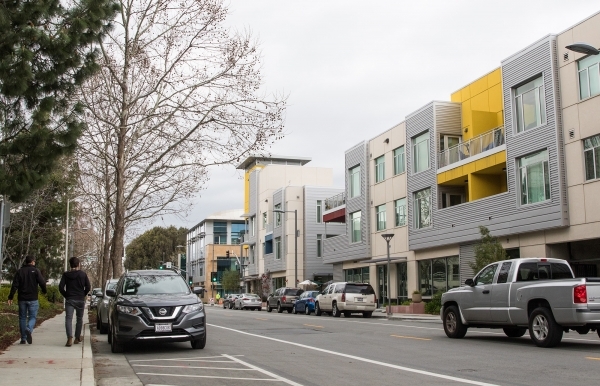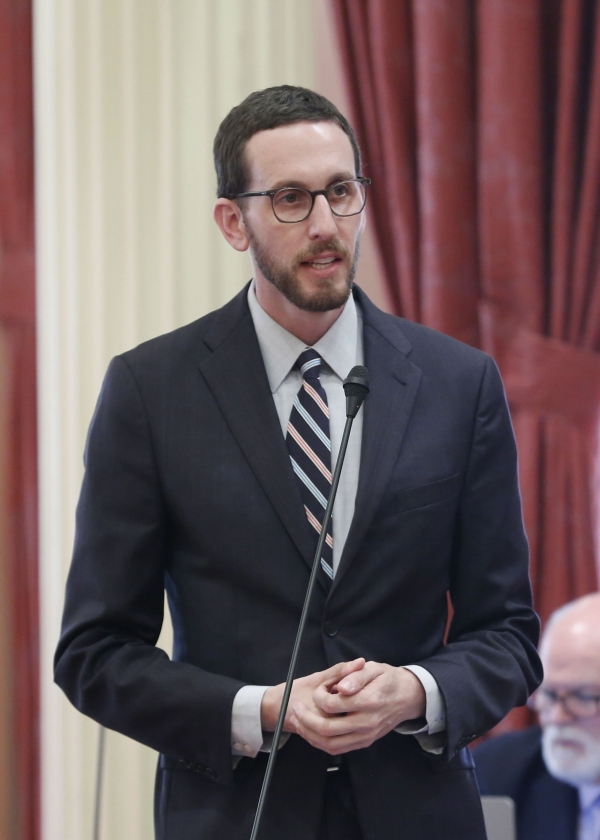A last-gasp attempt to resurrect Senate Bill 50, a divisive housing bill that would have relaxed zoning standards for residential developments, fizzled on the Senate floor on Thursday morning.
The state Senate voted 18-15 in favor of Sen. Scott Wiener's bill, leaving it three votes shy of the 21 it needed to advance. The vote means that the legislation will not move ahead in the current legislative session.
The bill was facing an uphill climb after the Senate similarly voted 18-15 in favor of the bill on Wednesday afternoon, leaving it three votes shy of advancing to the Assembly and, ultimately, to Gov. Gavin Newsom. The Wednesday vote was immediately followed by a "motion to reconsideration," making it eligible for another vote before the Jan. 31 deadline.
But any hopes that housing advocates had that the new vote would change the bill's fate faded on Thursday morning. Unlike the Wednesday hearing, which featured two hours of debate, the Thursday proceedings were brief, with Wiener making a statement imploring his colleagues to support the bill, followed by the vote.
"We have the opportunity today to take a step forward, to reform our broken zoning system, our broken housing status quo and, in conjunction with other policies that have been passed in the last few years and that will move forward this year, I think we can create a very strong foundation for a brighter housing future for the state of California," Wiener said moments before the vote.
Immediately after his speech, the bill received 17 votes. After a brief recess, it gained one more, still leaving it short of the threshold needed for passage.
The debate over SB 50 transcended the Senate's partisan divide, with numerous Republicans offering their support to Wiener, D-San Francisco, while various Democrats voted against the bill. Those who supported it underscored the severity of California's housing crisis and the role that zoning has played in preventing new housing.
"You can have the most streamlined process in the world. You can have enough funding for affordable housing, but if the zoning says you can't build something, that's the end of the process," Wiener said during Wednesday's hearing. "Restrictive zoning puts a hard cap — full stop — on our ability to get out of the crisis."
If approved, SB 50 would have loosened height and density requirements for housing developments in transit-rich and jobs-rich areas, respectively. It would have allowed housing developments of up to four stories (45 feet tall) within a half mile of transit hubs while eliminating limits on density for housing developments in "jobs rich" areas, including single-family neighborhoods.
And under amendments that Wiener made earlier this year, the bill would have given cities the option of adopting their own zone changes that would produce as much — or more — housing as they would under SB 50. Those that fail to do so within two years would have been required to comply with the bill's provisions.
In introducing the legislation Wednesday, Wiener emphasized that the intent of SB 50 was to address "real people and the pain that millions of Californians are suffering right now throughout the state." This, he said, includes children who go away to college and cannot go back to the community where they grew up, residents who are forced to live in cars and families who have to leave the state because of housing costs.
"When it comes to housing in California, we can no longer afford our broken status quo," Wiener said.
Some senators, including those from Los Angeles, lauded Wiener's efforts to address the housing crisis but said they cannot support the bill because it does not do enough to address housing affordability or protect their communities from gentrification.
Bob Hertzberg, D-Los Angeles, criticized the bill for the provision that created a two-year implementation delay and argued that getting the bill "right" is just as urgent as passing it.
"If I'm a developer contemplating a project, this bill gives me a huge incentive not to build now but to sit on my hands for three years," Hertzberg said. "Why build two stories when you can build five stories later? And in LA, you cannot pick a worse time to inadvertently put sand in the gears."
Sen. Jerry Hill, D-San Mateo, voted against the bill. He did not speak during the Wednesday debate but said in a statement after the vote that he does not believe SB 50 addresses California's crucial need for affordable housing.
He also said he hopes the bill can "undergo a full legislative process this year and be positioned to obtain broader support from our colleagues and our community.
"We need clearer parameters on the housing creation required for local governments and our communities, and on the flexibility allowed to local governments to locate housing where it works best for our communities," Hill said in a statement. "We also need a realistic view of the parking needs created by new housing. To require none ignores reality and worsens existing parking shortfalls in the very transit corridors where the legislation seeks to foster new housing."
"I could not in good conscience vote in favor of this bill as presented today," he added.
Immediately after the Thursday vote, Senate President pro Tempore Toni Atkins, a supporter of SB 50, assured her colleagues and state residents that the debate over increasing California's housing supply isn't over and that the Senate will pass a bill to alleviate the state's housing shortage this year.
"To those of you who have concerns about SB 50, you have effectively shared how it will impact local communities and I thank you for that, but now it is time for all sides to step up," Atkins said. "SB 50 might not be coming forward right now, but the status quo cannot stand."
Wiener said Thursday after meeting that while he is very disappointed at the result of the vote, he will keep moving forward on finding ways to increase California's housing stock. He noted that both Newsom and Atkins have been "crystal clear that there must be a very strong, real housing-production bill this year."
"I am committed to working with my colleagues, with the leadership, with the governor, with our supporters and our constructive critics, and with colleagues who didn't support SB 50," Wiener said at a news conference after the vote. "We have to move forward because this isn't about any one of us, it's about the future of the state of California."
He also said in a statement that the fight for more housing will continue.
"We will not give up until we have put California on a positive and sustainable path to a better housing future," Wiener said. "I will soon be announcing new housing production legislation."




Comments
Another Mountain View Neighborhood
on Jan 30, 2020 at 5:17 pm
on Jan 30, 2020 at 5:17 pm
Removing local control to this extent, means the State takes over the management of housing in every city in California. Just because you want to live in Hillsborough or Woodside, doesn't mean you can. The reality is you live where you can afford. This might mean working very hard, limiting your family to what works within your budget, and moving to a city for work where your salary supports a house or apartment. Of course we'd all like to see everyone living where they would like, but how is that reality?
Cuesta Park
on Jan 31, 2020 at 9:06 am
on Jan 31, 2020 at 9:06 am
Somewhere I thought I read that polling, within State Senator Hill's peninsula district, found that a clear majority of people supported SB50. Yyet Senator Hill voted against it yesterday, siding with anti-housing advocates like the $$ed interests controlling the Los Altos City Council.
So be it! Hill will be gone next year.
Old Mountain View
on Jan 31, 2020 at 10:11 am
on Jan 31, 2020 at 10:11 am
Previous comment talks about money interest but doesn’t highlight the money interests behind SB50...developers and high tech companies who want more luxury condos and rentals for their high paid workers. The bill went down again because it doesn’t help build more affordable housing.
another community
on Jan 31, 2020 at 1:58 pm
on Jan 31, 2020 at 1:58 pm
SB50 was a sell out. The labor union and the developer real estate interests lobbied the governor and Weiner to do this monstrous give away to them. It's not clear if it would really add to the housing supply much at all. It takes so much money to build luxury housing that the investments would not go very far. Maybe 10% overall would
go to affordable housing of some sort, counting units only not costs. But it could also be as little as 5% going to affordable housing. Projects 10 and under had no affordable requirements but can still go 45 feet tall. They could be quite gross.
Nothing to help affordability in a 10 unit project 45-55 feet talk with luxury features.
The overall estimate of 3 million homes needed is a joke. We really just need more affordable units. 300,000 to 800,000 affordable units would really help things. No way was that big of a number going to be built under SB50.
The state should put money toward funding affordable units. It can't expect to have the private sector solve this. With a $20 Billion budget surplus the state should use half of that to FUND affordable housing. Buy into private projects and up the affordable units from 10-15% at present to be more like 50%. Keep ownership and take the earned money back into the state affordable housing program, especially if it makes state land available to the private developments. Issue bonds to fund still more construction. Keep this up in future years, even if less than $10 Billion in those years. The state could really address the affordability issue if it spends funds and uses its credit and surplus land. But right now the developers just take a huge cut out of any state incentives, and the state has no ongoing ownership rights. If this is a crisis, the state should spend money! We have 2.3 Million already approved units. The developers are having trouble getting funding for their projects. Inject tom state funds to increase the number of units being built, by adding more affordable units. 10% affordable is not enough!!! That's what was wrong with Sb50.